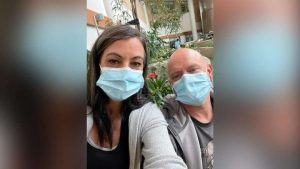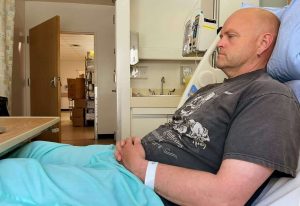Applications open for federal vaccine injury compensation

The federal government began accepting applications for its vaccine injury support program this week, but some people diagnosed with rare but serious conditions after their vaccinations aren’t sure the compensation goes far enough.
P.E.I. woman hospitalized over ‘extremely rare’ COVID-19 vaccine allergy shares her story
Serious side effects have been very rare among the millions of doses administered in Canada this year. But they’re possible with any vaccine, and this new program covers not only COVID-19 shots, but other vaccinations as well.
To qualify, a person has to have received a Health Canada-approved vaccine in Canada and be diagnosed with “a serious and permanent injury.”
But what if someone’s significantly injured and can’t work for a while, but eventually recovers months later? Would that qualify for help?
Murry Hellekson hopes so.
Prior to his COVID vaccination at a pharmacy near his home in Edson, Alta., he was a healthy 49-year old who did physical work at a local lumber mill. A couple of weeks later, he started to feel some numbness and tingling. His arms and legs lost strength.
Alarmed, he made several trips his local ER before he was referred to neurologists in Edmonton who finally diagnosed Guillain-Barré Syndrome (GBS), a rare neurological condition where the body’s immune system is triggered into attacking its nerves. Left untreated, it causes paralysis.
“I’ve never had anything like this before in my life,” he said. Fearing he might not make it, he started phoning family members.
His wife Jennifer Donovan also had to take time off work to care for him.
“Watching your spouse go from tough guy, go-go-go all the time, to not even being able to walk. Everything goes through your mind,” she said.
After five days in hospital, Hellekson returned home. But he could be off work for four to six months — just because he did the right thing, heeded the government’s call and got vaccinated.
“I think the government should have your back,” he said.
His hands and legs remain numb, and he has to walk with a cane. “Some people never recover from it fully,” he said, but he remains hopeful he will.
15 cases so far
Matthew Dawe, 40, was walking his dog in Calgary about ten days after receiving his AstraZeneca vaccine when his feet went numb. Within hours, he was in an ER, slowly losing function in different parts of his body.
Health-care workers didn’t immediately recognize what was wrong — for a while, they even thought it could be COVID-19. But eventually he was diagnosed with GBS.
“You don’t know where it’s going to stop,” Dawe said. He said he’d run a 5K only days before he found himself in hospital. He prayed his treatments would work before paralysis reached his lungs and he’d have to go on a ventilator.
His doctor, like Hellekson’s, reported this vaccine side effect to Health Canada. While it remains rare, they’re not alone: as of May 21, Health Canada’s adverse events tracking system shows 15 cases of GBS on a list of several hundred other individuals who have reported serious side effects.

The department told CBC News that seven of these cases have been linked to a dose of the Pfizer-BioNTech vaccine and eight to doses of AstraZeneca’s.
“I feel very fortunate,” Dawe said. He got treatment before he lost too much muscle. And as a project manager with Shell Canada, Dawe has benefits to cover medical expenses, therapy and time off work. He knows others aren’t so lucky.
The new federal sickness benefit for COVID-19 doesn’t help people who get sick from a vaccine, rather than the virus itself.
‘Draconian’ criteria
The men found each other, and others in the same boat, online, after searching for information and help.
Now they want others to be aware this can happen in rare situations, and take any warning signs seriously. Doctors need to be more aware too, they said.
Hellekson said he’s sick of watching politicians talking about how they’ll help you if you get COVID-19, but “if what the government gives you, to put in your arm, injures you? No help. Before they started giving the vaccines out and the big push to do it, they should have had this in place.”
Until the pandemic hit, Canada was the only G7 country where the government didn’t assume all the liability for injuries to protect vaccine developers from lawsuits. But the federal government’s COVID-19 vaccine purchase contracts required it to set up a national no-fault compensation program, retroactive to early December, when needles began plunging into Canadian arms.
In an email to CBC News, Health Canada said the new program will define “serious and permanent injury” as “a severe, life-threatening or life-altering injury that may require in-person hospitalization, or a prolongation of existing hospitalization, and results in persistent or significant disability or incapacity, or where the outcome is a congenital malformation or death.”
Dawe said he finds the program’s language somewhat “draconian” and subjective, suggesting it sounds like the government is trying to limit its payouts.
“In eight months, if I’m back to baseline, does that prohibit me from getting access to the damages?” he asked.
“That’s not the way the real world works. If you absorb all liability from an agency, you can’t just filter out what part of the liability you want to take on. You want to take liability for permanent damages but not pain and suffering? The government would be the only ones who’d have a chance at doing that. Anyone in their private lives would be roasted alive.”
Dawe said he plans to hire a lawyer to help him with his application, to make sure he’s ready to appeal if he needs to. Hellekson might too.
Comparable compensation schemes in other jurisdictions could offer someone with GBS in the neighbourhood of $120,000. Someone who died following vaccination — which happened with several recent blood clot cases in Canada — could receive closer to $250,000.
Health Canada declined to answer questions from CBC News earlier this spring about the precise amounts available and the total funding allocated for compensation. But 2021-22 spending estimates tabled in Parliament seek authorization for $19 million to cover the program’s first months of operations.
Flexible, ‘not confrontational’
The program is modelled after a compensation scheme available in Quebec since the late 1980s.
A third party, RCGT, has been contracted to administer the program and will oversee the processing and adjudication of claims, based on criteria set by the government.
Similar programs use a standardized table of injuries known to be associated with vaccinations, then assess whether the applicant’s condition falls within a reasonable time period following vaccination.
Applications will be reviewed by medical experts on a case-by-case basis, the application portal says, and could cover lost income replacement, death and injury benefits, funeral expenses or the reimbursement of otherwise uncovered medical expenses.
Kumanan Wilson, an epidemiology researcher and medical professor at the Ottawa Hospital Research Institute, was consulted on the design of this program. He said he expects adjudicators to apply a civil law threshold, weighing the evidence in decisions, instead of compelling applicants to prove definitively that their vaccinations caused them harm.
“The tribunal system is far less adversarial than the U.S. system where you go to a court,” he said. “It’s not meant to be confrontational. It’s meant to be fair. It’s meant to be permissive.”
Ambiguous language in the criteria allows some flexibility in its interpretation, he said, particularly as the science on documented COVID vaccine side effects continues to evolve. “It’s a living document and it will change.”
“Feedback is going to be really important from the public,” he said, especially if vaccines are going to be required as conditions for employment in certain fields. “My bias would be yes, those people should be compensated.”







Redes Sociais - Comentários